Cyclone Fani: Indians shelter from cyclone's onslaught
A powerful cyclone has slammed into India's eastern coastline, bringing torrential rains and winds of up to 200 km/h (125mph).
Cyclone Fani, one of the most severe storms to hit the region in recent years, made landfall at 08:00 local time (02:30 GMT) on Friday.
More than one million people have been evacuated from the eastern state of Orissa, also called Odisha.
Eight people have been killed in India, according to the PTI news agency.
The cyclone made landfall in the tourist town of Puri, which is home to the 858-year-old Jagannath temple.
A state official told the AFP news agency that although official figures had not been confirmed, around 160 people had been injured in Puri alone.

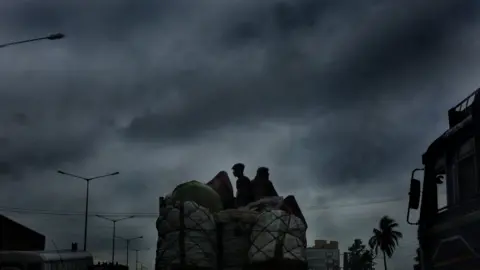 EPA
EPAFlooding has also been reported in several areas, and forecasters say a storm surge of 1.5m (5ft) could threaten low-lying homes.
India's Prime Minister, Narendra Modi said $140m (£106m) was being allocated for emergency relief.
Authorities in Bangladesh said one person had been killed by a tree, and that 14 villages were flooded as a tidal surge breached dams.
Around 400,000 people have been taken to shelters, officials told AFP.
What is the latest?
Numerous flights and train services in and out of the state have been cancelled, while schools and government offices are shut. Operations at three ports on India's eastern coast have also been shut down.
Naval warships and helicopters are on standby with medical teams and relief materials. The country's National Disaster Response Force (NDRF) has also deployed several teams there.
India's National Disaster Management Authority has warned people along the east coast, especially fishermen, not to go out to sea because the conditions are "phenomenal".
The agency said the "total destruction of thatched houses" was possible, as well as "extensive damage" to other structures.
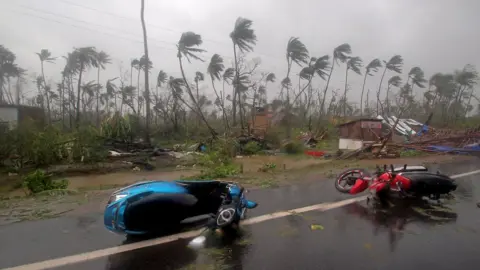 EPA
EPAThe cyclone is expected to move towards Chittagong in Bangladesh in a weaker form on Saturday.
It coincides with high tides in the country, which may exacerbate potential flooding issues there.
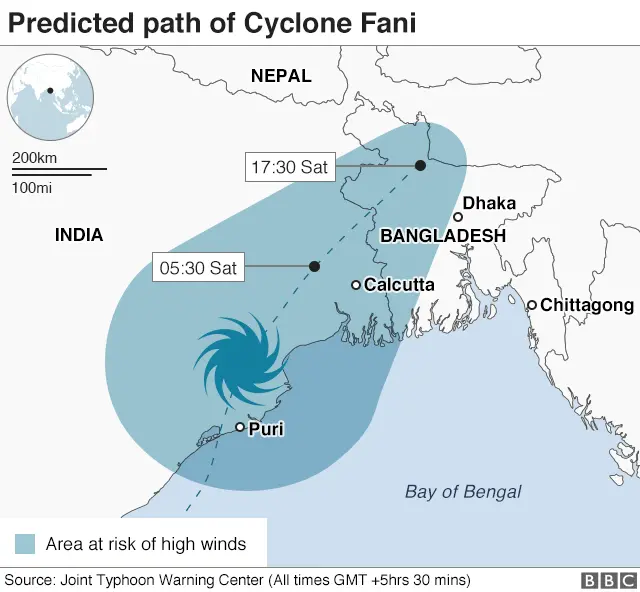
The port city of Cox's Bazar, where hundreds of thousands of Rohingya refugees live in camps with minimal shelter, is also on alert. But the cyclone is currently not expected to hit the camps unless it changes path, which is not thought likely.

How has India prepared?
In February the International Federation of Red Cross and Red Crescent Societies (IFRC) began distributing tarpaulins ahead of the region's "cyclone season" - but warned that if a deadly storm rolls in, shelters made of battered bamboo and shredded plastic would offer little protection.
The navy, the coast guard and the National Disaster Response Force have all been prepared for deployment.
Two ships with divers and doctors have been stationed at the southern port cities of Vishakapatnam and Chennai (formerly Madras), an official told local media.
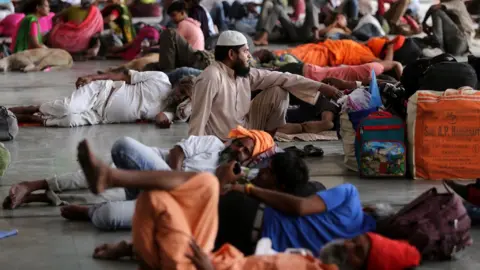 Reuters
ReutersIn 2017, Cyclone Ockhi killed more than 200 people and displaced hundreds. In October last year, officials in Orissa evacuated hundreds of thousands of people when another cyclone struck.
But India has improved its protections and responses to these disasters in recent years. The state's most deadly cyclone on record took place in 1999, killing almost 10,000 people.
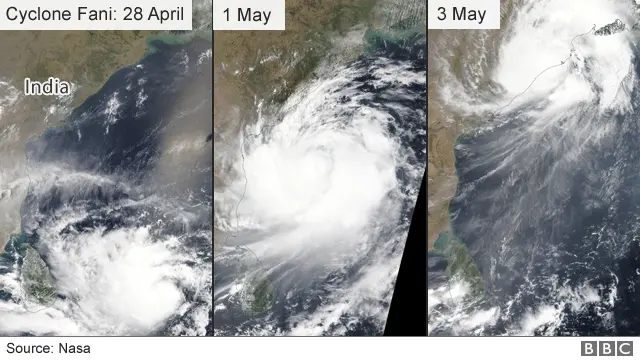
India's electoral commission has relaxed its rules about what the government can do during election periods so that the authorities can carry out relief work.
The country is in the middle of a multi-phased election which started last month.
Under normal circumstances the incumbent government has certain powers suspended, so that it can't announce new schemes or take new decisions during the voting period.
Although the election will continue until the end of May, Orissa has already voted.

Are you in the region? What are conditions like at the moment? What preparations have you made? Email [email protected]
Please include a contact number if you are willing to speak to a BBC journalist. You can also contact us in the following ways:
- WhatsApp: +44 7555 173285
- Tweet: @BBC_HaveYourSay
- Send pictures/video to [email protected]
- Upload your pictures / video here
- Text an SMS or MMS to 61124 or +44 7624 800 100
- Please read our terms of use and privacy policy
